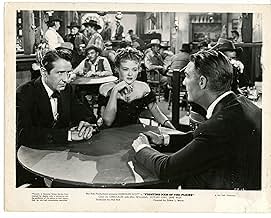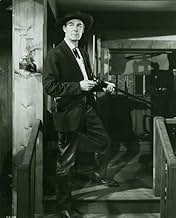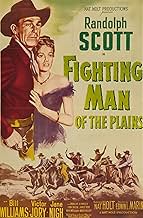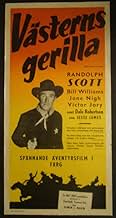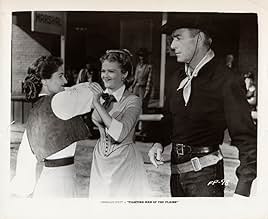IMDb-BEWERTUNG
6,5/10
600
IHRE BEWERTUNG
Füge eine Handlung in deiner Sprache hinzuFormer bandit Jim Dancer becomes marshal of a Kansas town and cleans up the criminal element--with help from an old pal, Jesse James.Former bandit Jim Dancer becomes marshal of a Kansas town and cleans up the criminal element--with help from an old pal, Jesse James.Former bandit Jim Dancer becomes marshal of a Kansas town and cleans up the criminal element--with help from an old pal, Jesse James.
Empfohlene Bewertungen
Although I only saw this film once (when it was released 50 years ago), it is one of my favorite Randolph Scott westerns. The combination of a turbulent setting (Quantrill's murderous raid on Lawrenceville, Kansas, and post Civil War Kansas ) and the main character's efforts to atone for his wartime actions by keeping the peace in a violence prone Kansas cow town rank it even with or better than Scott's later films directed by the acclaimed director, Budd Boetticher.
When you have Randolph Scott, you don't need much else, but "Fighting Man of the Plains" has everything.
Frank Gruber was a darn good writer of often very gritty stories. He wrote more than one story about Jesse James, a character who figures in this movie, too.
There is a rough realism in his stories, and that has translated beautifully in this film, thanks in part to Gruber's also writing the screenplay, and thanks to excellent directing by Edwin L. Marin, and thanks especially to a superlative cast.
One mark of a well-written and -directed film is the realism of the interaction of minor characters.
Another mark of a great movie is the number of speaking and participating characters, even with relatively small parts.
In "Fighting Man of the Plains," watch the anonymous characters, such as the blacksmith who's asked for directions, and the bartender who passes on messages and serves meals. In lesser films, they might get to nod or maybe point, but in a great film, such as this one, they speak and participate in what's going on.
Look for, for example, the great John Hamilton, and the great Paul Fix as a sleazy, vile character. Watch, too, for such greats as Lou Nova and Kermit Maynard. And not one of them gets screen credit! This is a great movie, extremely well done, and I urge you to see it.
Frank Gruber was a darn good writer of often very gritty stories. He wrote more than one story about Jesse James, a character who figures in this movie, too.
There is a rough realism in his stories, and that has translated beautifully in this film, thanks in part to Gruber's also writing the screenplay, and thanks to excellent directing by Edwin L. Marin, and thanks especially to a superlative cast.
One mark of a well-written and -directed film is the realism of the interaction of minor characters.
Another mark of a great movie is the number of speaking and participating characters, even with relatively small parts.
In "Fighting Man of the Plains," watch the anonymous characters, such as the blacksmith who's asked for directions, and the bartender who passes on messages and serves meals. In lesser films, they might get to nod or maybe point, but in a great film, such as this one, they speak and participate in what's going on.
Look for, for example, the great John Hamilton, and the great Paul Fix as a sleazy, vile character. Watch, too, for such greats as Lou Nova and Kermit Maynard. And not one of them gets screen credit! This is a great movie, extremely well done, and I urge you to see it.
This is a real humdinger of a western. The plot and dialogue move along quickly, with no time wasted on unlikely romance or saloon song. On the contrary, this tight little gem centers fully and solely on the great Randolph Scott. Here, Scott is at his lean, trim, handsomest best; the director senses this, and the film is noteworthy for featuring a number of lovely, soft, lingering close-ups of Randolph's grim face. To me, this is a wonderful touch and a delightful tribute to one the Westerns' greatest stars.
The co-stars are fine as well, but they definitely play second fiddle to Scott. One unexpected twist involves the town's "tinhorn" gambler, played by Victor Jory. Jory is the only member of the town to recognize Scott as a wanted outlaw, and is certainly in a position to blackmail him; however, in a quite unusual development, Jory chooses to befriend Scott, and remains his loyal friend to the end.
"Fighting Man on the Plains" is the perfect late-40's Western, a fully mature old-fashioned good-guys vs. bad-guys bit of adult theatre, a genre film crafted to its full potential; and it sets the stage nicely for the more psychologically complex Westerns of the 50's.
Highly recommended for lovers of Westerns.
The co-stars are fine as well, but they definitely play second fiddle to Scott. One unexpected twist involves the town's "tinhorn" gambler, played by Victor Jory. Jory is the only member of the town to recognize Scott as a wanted outlaw, and is certainly in a position to blackmail him; however, in a quite unusual development, Jory chooses to befriend Scott, and remains his loyal friend to the end.
"Fighting Man on the Plains" is the perfect late-40's Western, a fully mature old-fashioned good-guys vs. bad-guys bit of adult theatre, a genre film crafted to its full potential; and it sets the stage nicely for the more psychologically complex Westerns of the 50's.
Highly recommended for lovers of Westerns.
Renowned western novelist Frank Gruber wrote the script of FIGHTING MAN OF THE PLAINS (1949) based on his own book. It tells the story of Jim Dancer (Randolph Scott), a fugitive outlaw who'd been part of Captain William Quantrill's infamous raid on Lawrence, Kansas on August 21, 1863. Dancer is apprehended by a "Pleasanton" (read: Pinkerton) detective who is then killed in an accident, allowing Dancer to take his identity and wind up in Lanyard, Kansas, where he's pressured into taking the job of Marshal after fearlessly subduing some rowdy cowboys. It's a fairly corrupt town, but the new Marshal does a good job of keeping the peace and gets aid from some unexpected quarters at the local gambling hall.
The script is awash in simmering undercurrents, including the fact that the man who owns the town, Slocum (Barry Kelley), had killed Dancer's brother during the war, and Dancer had killed Slocum's brother in response during the Lawrence raid. Slocum's niece (Joan Taylor), who'd witnessed the killing of her father a decade earlier, lives with her uncle but fails to recognize Dancer as the culprit and begins to fall for him. Meanwhile the gambling saloon owner, Oldham (Victor Jory), finds his voluptuous partner, Florence (Jane Nigh), falling for Dancer as well. Eventually, Slocum alienates both the local cattlemen and the railroad company through his efforts to control all the land around town and a showdown is inevitable. At one point, a detective from Chicago shows up, summoned by the suspicious Slocum, to see if "Marshal Cummings" (Dancer's new identity), is indeed his old detective buddy. To make matters worse, Slocum's got cocky young gunslinger Johnny Tancred (Bill Williams) in his pocket, ready to take over when the tide turns. Dancer has his own ace in the hole, however, thanks to his old wartime associations. The finale offers a clear violation of the Production Code, but I can see where the blurred lines between good and bad, lawman and lawbreaker, "respectable" and disreputable could have easily confused the censors.
Lots of stuff happens in the movie and the cast of characters is quite colorful. Things never slow down and surprises come at us pretty quickly. I had a great time watching this. I never felt it getting too far-fetched for me. The cast includes plenty of old hands at this kind of thing (Scott, Jory, Paul Fix, Douglas Kennedy) and a few new hands (Taylor, Nigh, Williams) and they're all good. Jory is particularly awesome. He comes off initially as his patented oily gambler, but he proudly defies our expectations. Future western star Dale Robertson appears as Jesse James in his first credited role. He has only two scenes—one good one and one great one. Film noir regulars Barry Kelley and Berry Kroeger are both on hand, one as a bad guy and one who'll surprise you.
I watched this on TCM, which showed a black-and-white print of a Cinecolor film. I hope someone finds a color print and releases it on DVD.
The script is awash in simmering undercurrents, including the fact that the man who owns the town, Slocum (Barry Kelley), had killed Dancer's brother during the war, and Dancer had killed Slocum's brother in response during the Lawrence raid. Slocum's niece (Joan Taylor), who'd witnessed the killing of her father a decade earlier, lives with her uncle but fails to recognize Dancer as the culprit and begins to fall for him. Meanwhile the gambling saloon owner, Oldham (Victor Jory), finds his voluptuous partner, Florence (Jane Nigh), falling for Dancer as well. Eventually, Slocum alienates both the local cattlemen and the railroad company through his efforts to control all the land around town and a showdown is inevitable. At one point, a detective from Chicago shows up, summoned by the suspicious Slocum, to see if "Marshal Cummings" (Dancer's new identity), is indeed his old detective buddy. To make matters worse, Slocum's got cocky young gunslinger Johnny Tancred (Bill Williams) in his pocket, ready to take over when the tide turns. Dancer has his own ace in the hole, however, thanks to his old wartime associations. The finale offers a clear violation of the Production Code, but I can see where the blurred lines between good and bad, lawman and lawbreaker, "respectable" and disreputable could have easily confused the censors.
Lots of stuff happens in the movie and the cast of characters is quite colorful. Things never slow down and surprises come at us pretty quickly. I had a great time watching this. I never felt it getting too far-fetched for me. The cast includes plenty of old hands at this kind of thing (Scott, Jory, Paul Fix, Douglas Kennedy) and a few new hands (Taylor, Nigh, Williams) and they're all good. Jory is particularly awesome. He comes off initially as his patented oily gambler, but he proudly defies our expectations. Future western star Dale Robertson appears as Jesse James in his first credited role. He has only two scenes—one good one and one great one. Film noir regulars Barry Kelley and Berry Kroeger are both on hand, one as a bad guy and one who'll surprise you.
I watched this on TCM, which showed a black-and-white print of a Cinecolor film. I hope someone finds a color print and releases it on DVD.
One of the nice things about FIGHTING MAN OF THE PLAINS is seeing VICTOR JORY in a role where he's playing the hero's friend rather than a villain. It's an above average RANDOLPH SCOTT western that was apparently filmed originally in Cinecolor but the TCM print is in B&W.
Scott is a man running from his past who is mistaken for the lawman who captured him but got killed along the way to bringing Scott to justice. We learn later that Scott was justified in killing a man in self-defense and did not deserve a reputation as a lawless outlaw.
He proves such a good shot when attacked by a town bully, that the townspeople appoint him sheriff of a small Kansas town, post-Civil War 1870s. He's able to keep that disguise for most of the story, until some of the crooked elements in town find out his true identity and make trouble for him before he can explain what happened.
The whole story has a pleasant Zane Grey feeling about it--although it's an original one written for the screen. BILL WILLIAMS is cast against type as a villain and JANE NIGH is the romantic interest as Jory's business partner.
Plenty of action and a colorful story combine to make a good Randolph Scott western worth catching. DALE ROBERTSON is introduced as Jesse James, a man who comes to Scott's rescue when the going gets tough.
Scott is a man running from his past who is mistaken for the lawman who captured him but got killed along the way to bringing Scott to justice. We learn later that Scott was justified in killing a man in self-defense and did not deserve a reputation as a lawless outlaw.
He proves such a good shot when attacked by a town bully, that the townspeople appoint him sheriff of a small Kansas town, post-Civil War 1870s. He's able to keep that disguise for most of the story, until some of the crooked elements in town find out his true identity and make trouble for him before he can explain what happened.
The whole story has a pleasant Zane Grey feeling about it--although it's an original one written for the screen. BILL WILLIAMS is cast against type as a villain and JANE NIGH is the romantic interest as Jory's business partner.
Plenty of action and a colorful story combine to make a good Randolph Scott western worth catching. DALE ROBERTSON is introduced as Jesse James, a man who comes to Scott's rescue when the going gets tough.
Wusstest du schon
- WissenswertesJames Millican portrays a private detective who arrests Randolph Scott, who is playing a former member of Quantrell's Raiders. In Der schweigsame Fremde (1953), Millican plays Quantrell and once again, Scott is one of his former Raiders.
- Crazy CreditsOpening credits prologue:
The vast plains of the American West proved a barrier so formidable that the westward march of civilization faltered before it for more than a decade. Yet Civilization must move on and the Great Plains were finally conquered. This is the story of one of these builders of the West ... Jim Dancer, bad man, outlaw ..... Fighting man of the plains.
During the desperate days of the Civil War-August 21, 1863,- Quantrell's raid on Lawrence, Kansas.
The bloody war between the states finally came to an end, but on the border the hatreds had been too great. Men continued to ride and fight and die. The name of Quantrell was heard no more, but new names were whispered, names of men who had ridden with Quantrell and were now outlaws.
1868 ARCH CLEMENTS 1869 THE YOUNGER BROTHERS 1870 JESSE JAMES 1871 JIM DANCER 1872 -
- VerbindungenReferenced in Unguarded Moment (1951)
Top-Auswahl
Melde dich zum Bewerten an und greife auf die Watchlist für personalisierte Empfehlungen zu.
Details
- Laufzeit1 Stunde 34 Minuten
- Seitenverhältnis
- 1.37 : 1
Zu dieser Seite beitragen
Bearbeitung vorschlagen oder fehlenden Inhalt hinzufügen

Oberste Lücke
By what name was Die Rache des Jesse James (1949) officially released in India in English?
Antwort
